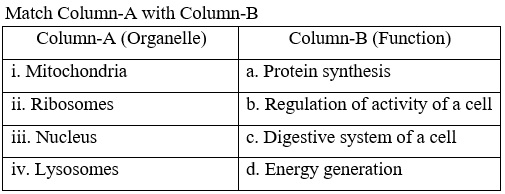Science and Scientific Research - General Knowledge Questions and Answers
(Q1) General Knowledge » Science and Scientific Research
Which of the following is used in photography?
Sodium hydroxide
Sodium thiosulphate
Sodium sulphate
Sodium bicarbonate
(Q2) General Knowledge » Science and Scientific Research
According to the Brihat Samhita, what do you call the process of making scents, mouth perfumes and bath powders?
Pattanga
Kamplcica
Gandhayukli
Jatuka
(Q3) General Knowledge » Science and Scientific Research
Which organic compound has the structure R−COOH, with R referring to the alkyl, alkenyl, aryl, or other group?
Carboxylic acid
Ester
Ketone
Aldehydes
(Q4) General Knowledge » Science and Scientific Research
In which group are the non-metal elements placed in a vertical column on the right side of the periodic table?
Group 1
Group 2
Group 3
Group 17
(Q5) General Knowledge » Science and Scientific Research
Earth’s core is mainly made up of ______.
nickel and iron
nickel and magnesium
nickel and copper
nickel and alumina
(Q6) General Knowledge » Science and Scientific Research
A group of ribosomes attached to mRNA is known as:
polymer
polypeptide
polysomes
monomer
(Q7) General Knowledge » Science and Scientific Research
Identify a protein-digesting enzyme.
Collagen
lipase
Amylase
Pepsin
(Q8) General Knowledge » Science and Scientific Research
Motion of an object is ______ if its velocity is constant.
non-uniform
uniform
only decelerating
only accelerating
(Q9) General Knowledge » Science and Scientific Research
The SI unit of electric charge is a ______.
joule
watt
coulomb
newton
(Q10) General Knowledge » Science and Scientific Research

i-d, ii-a, iii-b, iv-c
i-b, ii-a, iii-c, iv-d
i-c, ii-a, iii-d, iv-c
i-a, ii-b, iii-c, iv-d
(Q11) General Knowledge » Science and Scientific Research
Who discovered three chemical elements: cerium, thorium and selenium, and devised the modern method by which one or two letters are used to symbolise elements?
Hennig Brand
Niels Bohr
Jacob Berzelius
John Dalton
(Q12) General Knowledge » Science and Scientific Research
In which year did Langmuir reform the Lewis concept by abandoning the idea of a stable cubical arrangement of the octet and introducing the term ‘covalent bond’?
1921
1917
1919
1915
(Q13) General Knowledge » Science and Scientific Research
Which theory discusses the relationship between ligand bonding and degradation of d orbitals in metal complexes and the geometry of metal complexes and the splitting of d orbitals?
Molecular orbital theory (MOT)
Crystal field theory (CFT)
Valence bond theory (VBT)
Ligand field theory (LFT)
(Q14) General Knowledge » Science and Scientific Research
An undifferentiated layer, ______, is present in between the ectoderm and the endoderm.
Coeliea
Ectinoglea
Mesoglea
Acoelomea
(Q15) General Knowledge » Science and Scientific Research
Identify an example of diploblastic animals.
Platyhelminthes
Chordates
Arachnids
Coelenterates
(Q16) General Knowledge » Science and Scientific Research
Which of the following is NOT a conductor?
Hard rubber
Nickel
Silver
Copper
(Q17) General Knowledge » Science and Scientific Research
Chemical formula of washing soda is ______.
Na2SO4
NaHCO3
NaOH
Na2CO3.10H2O
(Q18) General Knowledge » Science and Scientific Research
What happens to the decomposition rate when detritus is rich in lignin and chitin?
It is slower
There is no movement
It is negligible
It is faster
(Q19) General Knowledge » Science and Scientific Research
In 1664, who discovered the fifth star in the Trapezium, an asterism (mini-constellation) in the constellation Orion?
Giordano Bruno
Johannes Kepler
Robert Hooke
George Willis Ritchey
(Q20) General Knowledge » Science and Scientific Research
What is the numerical value of a physical quantity?
Distance
Magnitude
Direction
Reference